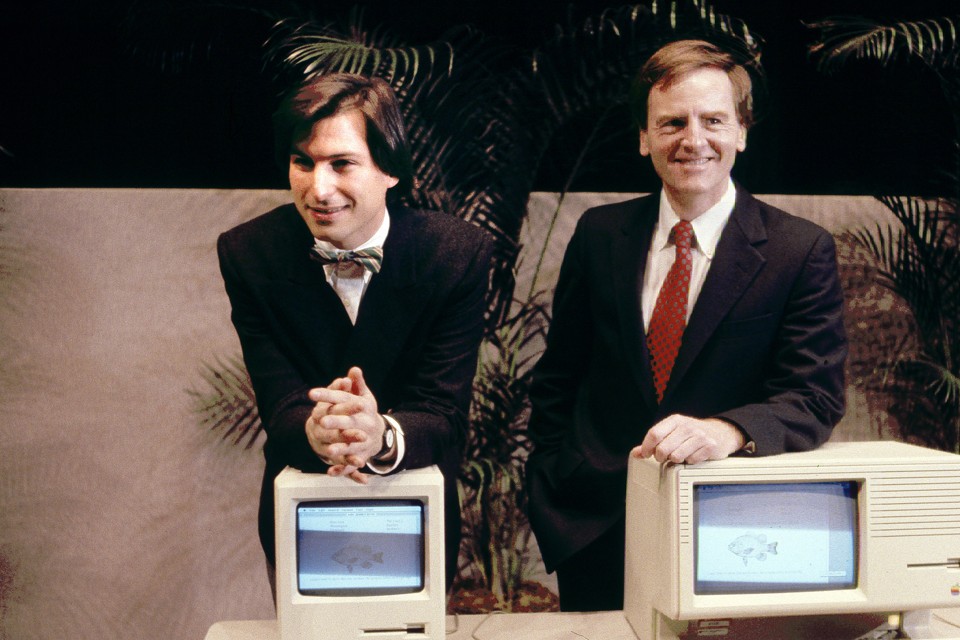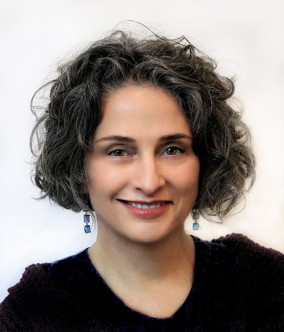What It Was Like to Write Speeches for Apple Executives

Apple CEO Steven P. Jobs, left and President John Sculley present the new Macintosh Desktop Computer in January 1984 at a shareholder meeting in Cupertino, California, USA. (AP Photo)
In the world of speeches, there is probably only one company that rivals the attention generated by politicians or celebrities: Apple. The company’s keynote events are legendary, and the brand’s cult status is hard to overstate—there are entire websites devoted just to rumors about the company. For Apple’s investors and its millions of fans around the world, product-launch events are a chance to indulge in their fascination with the company (which is currently worth nearly $500 billion) as well as pay close attention to the unveiling of the company’s latest gadgets.
Jayne Benjulian became Apple’s first chief speechwriter in the 1980s. Benjulian spent six years at Apple, and she’s since become involved in various forms of writing. She’s now a poet, and her new book, Five Sextillion Atoms, contains poems that tie together American history and her own family’s. I talked with Benjulian about her job at Apple, what makes a great speech, and her transition to poetry. A lightly edited transcript of our conversation follows.
Bourree Lam: How did you get into speechwriting?
Jayne Benjulian: After grad school, I was writing commercials in New York and I saw this 2-inch by 2-inch ad in the back of Adweek. The ad was for a copy chief at Apple. So I sent my portfolio, and in August I was hired and flying over the brown hills of Northern California. My first day at Apple was Halloween 1984. The Mac had been introduced in January—actually you can see the lost video on YouTube—so what a shock it was for a New Yorker to walk into a company where everyone was dressed in Halloween costumes. It was a huge change in culture. I was shown to my office and, on the counter, there was a Mac.
Lam: So you were hired as the copy chief, and then got into speechwriting?

Writer Jayne Benjulian (Marvin Kaplan)
Benjulian: I started writing speeches very shortly—about a month—after I got there. Pretty soon, I was doing two full-time jobs, and this is classic Apple. So I said, “Hey, I’m doing two full-time jobs. I think I should choose one of them to do.” I was asked which one I wanted to do, and I said I wanted to be a speechwriter.
At the time, Apple had one or two freelance speechwriters and I was told they weren’t going to fire them until we see how you do. So I wrote a speech, and that was the end of the freelance speechwriters and I started doing this full-time. Very shortly after, I started hiring journalists and training them in research and writing to do speeches, and that became Apple‘s first speech department. When I left, there were two full-time speechwriters and two researchers.
Lam: How many speeches did Apple give at the time that there needed to be an entire speech department?
Benjulian: The demand was huge. Everybody on the executive staff was giving speeches. The job was researching and writing Apple speeches, but pretty soon it became vetting all of the speeches Apple executives were asked to do and which speeches should they do. And if they should do them, which executive was appropriate to do them. So we had product introductions, analyst meetings, consumer conferences, partner meetings, employee meetings, and sales meetings—it was a tremendous amount of work to keep speechwriters more than busy.
Lam: What goes into making a good speech?
Benjulian: What was key to writing any speech of quality was a central idea. One idea, not ten. So every great speech has a major concept or message. Second thing, every speech has language meant to be spoken. They are monologues. They have shape and movement. Speeches are an oral medium. There are policy papers meant to be read out loud, and then meant to be read quietly at your desk. But a speech is a different thing.
Once, I took an Apple executive to a writing workshop to show him how actors work. He asked me: “How do you act sincerely?” Truthfully, it’s not an act. Great speakers risk being fully present in the moment. Look at [Steve] Jobs on those old videotapes. He’s deeply in the moment.
Lam: Did you work with Jobs at all?
Benjulian: I did not write speeches for Jobs. In Halloween 1984, he was on the way out of the company and by the summer he was gone. And by the time he came back, I was gone.
Lam: You mentioned that sincerity is one of the hard things about delivering a speech. What are the other elements a speechwriter has to pay attention to so it all hangs together?
Benjulian: One of the things that is, and was, difficult is that every speech has to be credibly spoken by a particular speaker and perfectly pitched to a specific audience. That means deep research into who was in each audience. So of course a speech is about your central concept, what it is you’re saying, but it’s also who’s saying it and whom you’re speaking to.
This is true today; it’s true of all the political speeches we’re listening to. So who is in that audience? Are they New York industry analysts? Partners? Consumers? Employees? And of course, there were the product launches where everything was top secret and everything had an element of surprise. That was a very different strategy from Apple‘s competitors who announced versions of products years in advance. But I think all those elements … those are all things I learned, practiced there, and took away with me.
Lam: Is there one really memorable speech you wrote?
Benjulian: I have, somewhere in my boxes, a speech and scrawled across the speech is: “This is incredibly good, Bill Campbell.” That was “Apple in the Office of the Future.” He was a very interesting man to write for, because he is someone who has his own ideas. So my job working with Bill, in large part, was to listen to him, tape him, and then to find ways to shape his ideas into an oral presentation. It’s always delightful to work for someone with a vision.
Lam: Is taping someone talking part of the speechwriting process?
Benjulian: Almost always. I would arrive ultra-prepared after hours and hours of research—much like journalists, which is why I think journalists can be trained to be great speechwriters. I would come with a tape recorder and a notebook, and I would ask questions, take notes, and tape. Then I would listen to the tape over and over again, because I wanted to understand the patterns of speech, the funny moments, what was important, what was stressed, what the ideas were.
In my mind, a speech shouldn’t sound like anybody could deliver it. It’s oral authenticity, but it’s also authenticity of feeling. And it’s hard! Not everybody can do it, truthfully. Speeches have to be fairly simple in some ways.
Lam: And now, you’re a poet and you’re involved with a theater company?
Benjulian: Silicon Valley was all about Apple for me. When I left Apple, I left California and went to study theater in Seattle. I wanted to understand the way actors worked, and I wanted to develop my own creative voice.
I ended up working as the director of play development at Magic Theatre in San Francisco. I wanted to write in my own voice. I wrote in the voice of middle-aged white men for a long time, since there was only one woman on that executive staff. And then, I helped playwrights realize their vision on the stage. It wasn’t long before I realized: “What is it I want to say?” I wrote poetry in my 20s, but I stopped for more than two decades. I went back to get an MFA in poetry, and my first collection comes out in June.
Lam: Are there any parts of your career at Apple that relate to your current job as a poet?
Benjulian: For example, an affinity for risk. You have to risk being downwardly mobile—almost nobody makes money at poetry. If you’re driven by a creative challenge, and to do the work regardless of what the payoff is, that’s something that’s critical for a poet or you can’t keep going. And I think that was true at Apple too. The money was fantastic, I will never deny that, but that wasn’t really what the work was about. It was about doing something creatively that no one had ever done before. The critical key to lyric poetry is allowing yourself to discover something in the moment of the writing, and that discovery becomes really what the poem is about.
This article first appeared in www.theatlantic.com



